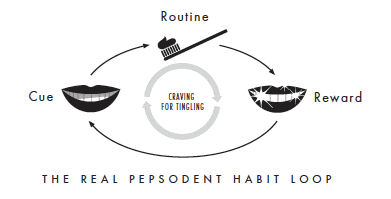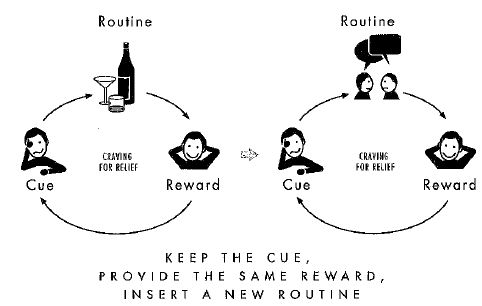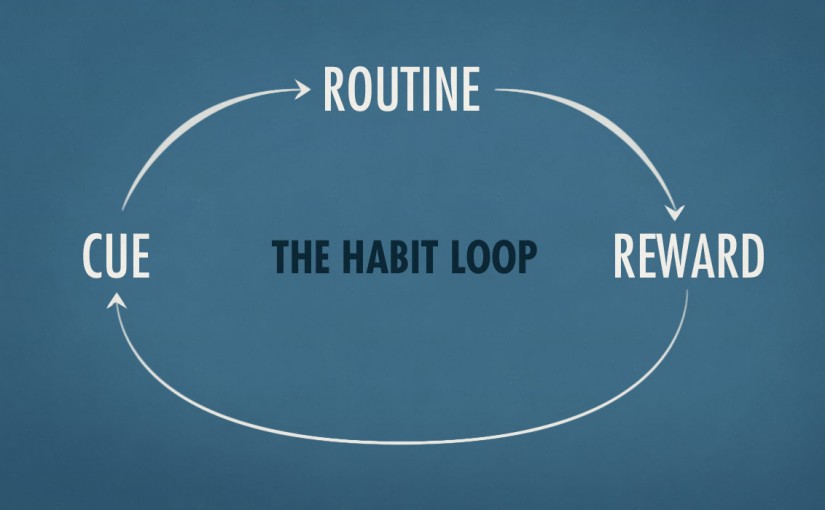Picture some of the following actions: Walking in your neighbourhood, solving 10 + 10, talking in your mother tongue, counting 6 oranges. Now imagine the following scenarios: Walking through a crowded railway station or airport, solving e2 cot 27.9, talking about science in a language that you cannot speak very well, counting 39 oranges. What difference did you notice between the two sets of situations?
If you pay close attention, you will notice that the amount of activity in the brain increases significantly during the activities in the second set. This is because those are situations that you are not used to being in on a regular basis. E.g. you may not even pay attention to your steps while walking through your neighbourhood, but while walking through the crowd of the railway station, you have to watch each step and be attentive. But if you are a regular commuter, even jostling through the crowd will become a habit. That exactly is the power of habits. Your mind runs in cruise mode when you perform activities as a habit and you will often find that it drifts into thoughts of its own while your body finishes the activity on its own accord. You can say that you are running on auto-pilot mode without thinking about it.
Your body’s auto-pilot as an advantage
Charles Duhigg has extensively covered the advantages of habitual auto-pilot in his book The Power of Habits. He talks of the following advantages.
- Your brain activity goes down and as a result you feel relaxed while performing activities out of habit. Think about the time that you are walking or brushing your teeth.
- Importantly, habit detaches the emotional part of your brain from the activity by building mental models of tough situations and helping your brain become routine based. Hotel management staff are continuously drilled in role plays involving hostile customers, so that when such a situation really occurs, they can handle it gracefully. Firefighters practice drills and are ready by the time a nasty fire goes off somewhere. This is also why taxi drivers are able to calmly ignore motorists cutting them off and mountain road drivers seem extremely zen-like when another vehicle approaches them from the other side of a hairpin bend.
- Habits make you think less and act faster. By the time a cue happens, you are already acting from body memory built out of sheer habits. This is why Lionel Messi is able to bamboozle four to five defenders on his way to spectacular goals. When defenders approach him to compete for the ball, Messi is already several steps ahead, because he doesn’t think. He acts and runs the other way as soon as he sees tiny cues, such as the direction in which the defender’s toes are pointed.
- Habits make sure that we are not using will power to force ourself to do something. E.g. after years of waking up at 8am, it is incredibly hard to wake up at 5am. We end up using tremendous will power to hoist our unwilling body out of bed. However after years of this routine, the body’s natural clock re-configures and soon we find ourselves opening our eyes before the alarm goes off.
The flip side of habits
However, not all is well with habits. Habits are a surefire way to improve the efficiency with which tasks are done, so that body memory, rather than the brain, can take over. But, that also means that we are not thinking about what we are doing. And this is where, really comical things can happen.
The secret factor
To understand how habits work, let us see how Duhigg explains the flow. For an activity to become a habit, we need three components. First, we need a cue to know when to start the behaviour. Secondly, we need a reward at the end. We then need a routine that leads us from the cue to the reward. However, there is another component that is key. The mind needs a craving for the reward, something that makes the reward addictive enough for the brain to want to keep doing it over time.
Let us talk about brushing our teeth. The cue is our waking up in the morning. The reward is clean teeth. The routine is brushing. But the reward is not enough to motivate us to keep brushing on a daily basis. Instead, what we crave is the tingling sensation that the mint and the various herbs in our toothpaste give us. This fresh sensation is what makes us come to the washbasin for brushing every single morning. We can make similar analysis with the process of bathing with a soap or having a cup of strong coffee to perk ourselves up. Alcoholics and drug addicts crave for the sensation of numbness and detachment of emotion that come with substance consumption. Nail biters crave for the sense of relief they get when they chew their nails.

Nail biting may be annoying, while drugs and excessive alcohol are downright wrong, but what exactly is wrong with brushing teeth with toothpaste or bathing with soap? Nothing to be worried about. It is just that clinically it is NOT necessary to use toothpaste or soap for our dental or dermatological hygiene. Despite any disagreements, we can achieve clean teeth by simply rinsing our mouth with simple homemade solutions, such as gargling water with some added salt and lemon extract. Quarter to half a bucket of water with an added disinfectant like dettol is enough for our bathing needs. By using tingling tastes and attractive frangrances, companies like Unilever and Procter & Gamble have mastered the science of craving as a way to build our habits. And once habits are set in stone, it is hard to make them go away pretty soon.
Zombie habits
Sometimes, the habits stick even after the rewards go away, simply because of the craving or because of body memory or they may attach themselves to the wrong cues. For instance, we may find ourselves eating fast food even when we are not hungry, just because of the craving for the sinful taste. Despite the introduction of pasteurised sachet milk in Indian cities, people still use the older techniques used on whole cow milk, such as heating the milk until it boils, a process which is actually redundant and unnecessary. Many companies follow really outdated procedures, like using Emails for sharing files, when there are more integrated options like Dropbox available, simply because ‘that is how they have always done it and it just works!’
Invoking manual drive every so often
It would be completely inappropriate to suggest that habits should not be built at all. Human is a creature of habits and they are what help us sail through the day smoothly. However, we must also have the habit of reviewing our habits frequently, say once a month. We set goals to achieve rewards. Using those rewards as targets, we build habits which drive us forward towards those targets. However it is necessary to ask if the set habits are really taking us towards the target, whether those habits are inadequate or even overkill? Are they too expensive or irrelevant given current circumstances? It is important to ask why we are doing what we are doing?

For instance, if our target is to clean our teeth, why are we using toothpaste? Can I replace this habit with another equally effective option? If I am feeling sleepy after lunch, why do I take a round to the coffee machine everyday? Why not take a round to the sink and splash my face with water and stand some place where I can get direct sunlight? This cigarette is giving me a relief from my stress for 30 minutes, but why do I need to smoke to mask my stress? Should I go for psychotherapy and get to the root of my problems? Why do I need to bite my nails when I stress over sports on TV? Can I alternatively give the stress ball a couple of tight squeezes when the score is 1-1 after 89 minutes?
Conclusion
It is well known that a man is a product of his habits. However, not all habits are made equal and not all of them are effective. It is required to constantly re-evaluate our habits as we, our environment and our goals change.
I would like to add a quick para about some habit changes that I have introduced in my life. Priya (my wife) and I do not boil pasteurised sachet milk anymore. We have been at it for more than two months and nothing has happened to our health! After reading Duhigg’s explanation of how Pepsodent made their toothpastes minty to introduce craving in their customers, I have re-evaluated whether we really need minty, herbal, multi-coloured toothpastes or toothpastes with salt for our oral hygiene. We made our own mouthwash by drying fruit peels of different fruits such as pomegrenate and orange, grinding them into powder and dissolving them in water. It provides the same tingle as store-bought toothpaste. I have been on this no-toothpaste practice for a couple of weeks now. Over the last two days, I have stopped taking bath from a shower or a full bucket of water and have rather been using the following procedure. I fill up a bucket with water only a quarter of its capacity and add a few drops of liquid soap. I use a couple of mugs of water to moisten up my body, then use a towel to scrub clean. I am open to using other solutions like Dettol or drops of essential oils like lemon grass extract in the water, instead of liquid soap. I do thoroughly drench and wash my hair though, but I am looking for alternatives to shampoo.
If given a chance to re-evaluate, which habits of yours will you change? Which ones will stay nearly forever? Let me know in the comments.

It is indeed a good thing to evaluate how we do certain automatic actions. It has helped me optimise my routes, workouts, time taken to shop, cook etc. Too much of it will be cognitive overload on insignificant things but the trick is to inject the right amount at right places and not be blinded by customs.
Yup, the right balance is important. Reviewing our habits once a month will do wonders. Remember how we optimised the habit of noting down expenses over time.